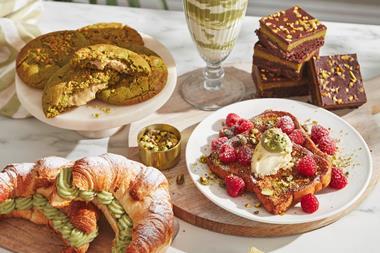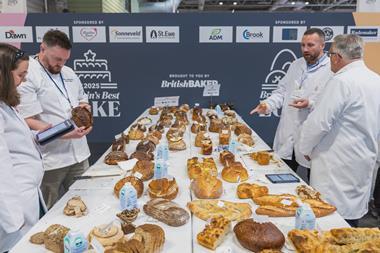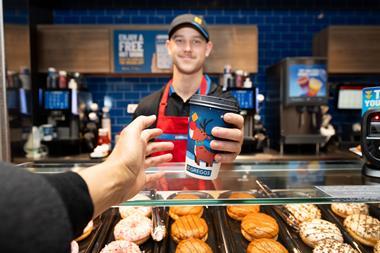Step and Stone is an artisanal bakery with a difference. The Bristol-based social purpose organisation, which produces lavosh flatbread, employs young people with learning disabilities.
As reported by British Baker earlier this month, the bakery is planning to boost its flatbread production, and consequently the number of young people it can help.
We caught up with Jane Kippax, who set up the bakery in November 2016 with Jane Chong, about the business and their plans for the future.
When did you decide to set up artisanal bakery Step and Stone?
Both Jane and I had ideas about setting up some kind of enterprise floating around at the back of our minds for a while. We both have children with Down’s Syndrome and met at a youth club organised by a local support group, Ups and Downs Southwest. We were part of a team organising a charity ball and it was at that point we realised we worked really well together.
Another important part of the jigsaw was finding out that the employment prospects facing people with a learning disability were dire: only 6% of these people are in paid employment. As parents ourselves, we were horrified, knowing full well that people with a learning disability really can and do make very valuable employees.
What bakery items do you produce and who does the business supply?
We produce a lavosh flatbread, which has a crunchy texture. It’s perfect with dips or cheese, but can also be served as a lovely alternative to bread for a host of dishes: tapas, across a bowl of soup or to give a bit of extra crunch alongside a salad. We really wanted to produce something unique, but also quite special – partly to show that people with a learning disability are very capable of producing delicious produce.
How many staff do you employ?
We employ six part-time staff, one of whom has Down’s Syndrome. Our original plan was to employ our young ‘trainees’ as they got nearer to being ready for work but sadly we haven’t been able to sustain that model. We are currently working with 15 young people who have a learning disability, with a few more normally joining us during the holidays. We’ve worked with around 20 people since we started and will have room for probably about 25 people once we start baking five days a week.
What work do they do?
For a relatively simple product, there’s a surprising variety of tasks, from weighing the ingredients and mixing and rolling the dough to making up the flat-packed boxes, weighing the lavosh and sealing in their polypropylene bags, not to mention the dreaded washing up. We also ask for volunteers to come along to farmers’ markets – a task many of our young bakers really love as it’s a chance to see first-hand what the public think about the products they’re making.
How does this work make them feel?
Everybody is so proud of the end-product – it’s so important that our young people feel they have a contribution to make. It has been wonderful to see people’s confidence grow. We had one young woman who was very cautious at the beginning – she only wanted to do the cleaning and make the tea. Now, she’s one of our star dough-rollers and will do everything she’s asked and we think her willingness to do new things has a direct link to how confident and successful she now feels. Structure, routine and predictability are also important for many of our young people and you cannot underestimate how important it is for everybody to have the opportunity to make new friends.
Why did you decide to set up as a community interest bakery?
Since our main motivation for setting up the bakery was to improve the employment prospects for people with a learning disability, it was really important to us that any profit would be ploughed back into the bakery. People with a learning disability are often quite socially isolated so, among other things, this money has helped contribute towards our monthly get-together. So far we’ve been bowling and to crazy golf. And, of course, no evening would be complete without a pizza at the end.
How did you fund the business?
Because a lot of our work is in training our young people and because we’re still quite a new enterprise, we’re still reliant on grant funding to cover our costs. Once we start to make a profit, we would like to revisit the idea of paying our young bakers once they’ve got to the stage of being job-ready. We’re very lucky to have had support from UnLtd and the National Lottery’s Awards for All programme, as well as some other trusts and foundations, and a private donor. The programme that really turned our idea into a reality was a Lloyds Bank/School for Social Entrepreneurs grant and 12-month training programme.
You plan to open a community interest café too. Can you tell us more?
We’re just about to move the bakery side of our operation, which is exciting. It will probably take us a few more months to settle in and possibly gear up to baking five days a week. Once we’ve done this, we’ll start to look for a café premises.
One of the biggest barriers to date has been the ‘ingoing premium’ most commercial places charge – a fee to cover second-hand equipment whether you can make use of it or not. But we’ll start being a little more proactive in our search in early 2019. We have lots of other ideas too – maybe one day we’ll get ourselves a mobile catering unit.
Where will the café be based and what facilities will it have?
We’d love to be based in a town in north Somerset or even the centre of Bristol. We’ve already thought about the kind of food we’d like to serve – in a nutshell both nutritious and delicious. Some of our young people are keen for us to get going on this idea – one is a trained barista and many others love foodservice.
It’s very important to us that customers come because they get fabulous food/coffee and great service – and that they don’t come just out of a sense of moral obligation.
We really want to show that people with a learning disability are valuable members of society – just like anyone else.

























No comments yet